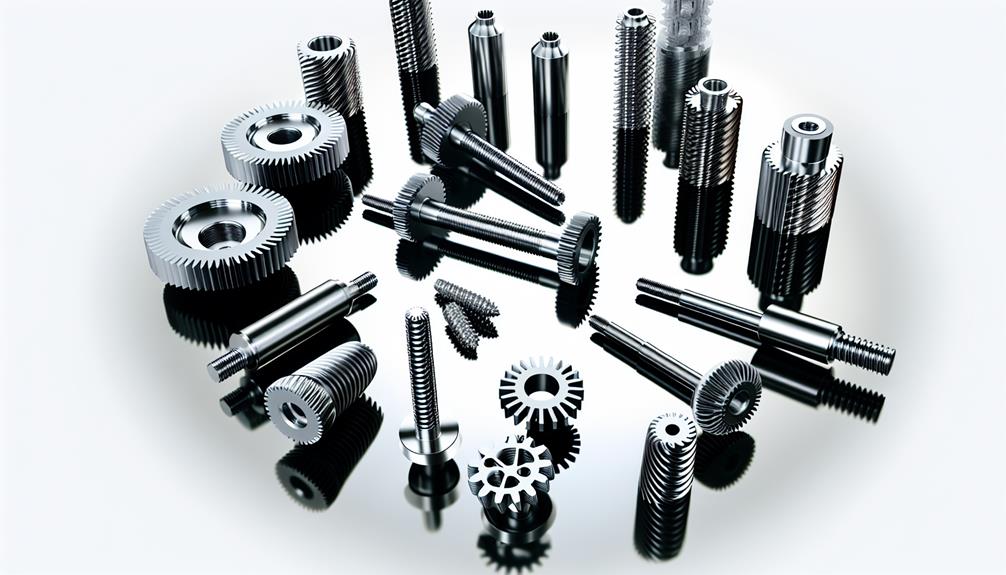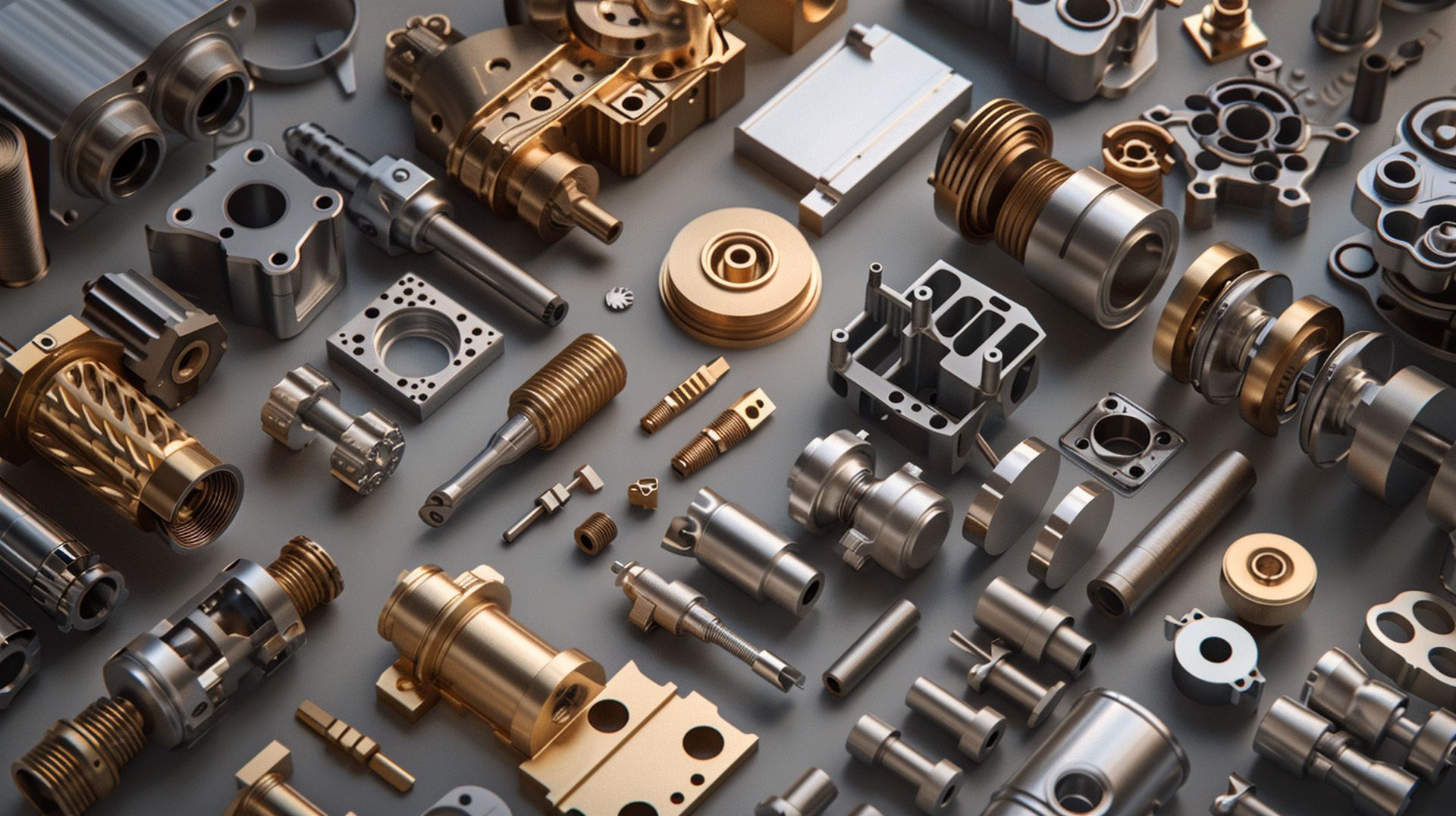Finding the Best CNC Machined Parts Suppliers
In the competitive landscape of manufacturing, selecting the right CNC machined parts suppliers is paramount. A supplier's ability to adapt to complex designs, maintain consistent quality, and offer competitive pricing can significantly impact production timelines and overall project success. As we explore the critical aspects of this selection process, it becomes evident that not only technical capabilities but also supplier reliability and the strength of customer service play essential roles. However, the question remains: among the myriad of available suppliers, how does one determine which are truly capable of meeting specific project demands while ensuring efficiency and cost-effectiveness? This discussion seeks to uncover those key indicators.
Assessing Supplier Expertise
Evaluating the expertise of CNC machined parts suppliers is crucial to ensure they meet industry standards and project specifications. Supplier qualifications play a pivotal role in establishing trust and reliability in the precision required for CNC machining operations. Expertise evaluation involves a thorough analysis of a supplier's certifications, such as ISO compliance, which guarantees that they adhere to international quality management standards.
To further assess a supplier's expertise, it's essential to consider their industry reputation and the longevity of their operations. Suppliers with extensive experience typically possess a deeper understanding of varying project demands and showcase a proven track record of consistency and precision. Moreover, the presence of skilled personnel, indicated by relevant training and certifications, signifies a supplier's commitment to excellence and continuous improvement.
It is also advisable to review past project portfolios to gauge the complexity of work the supplier has successfully managed. This evaluation provides insights into their capability to handle specific requirements and adapt to new challenges.
Evaluating Machining Capabilities
When selecting a CNC machined parts supplier, it's crucial to evaluate their machining capabilities comprehensively.
This involves examining their technical expertise, assessing how well they handle various materials, and analyzing the speed at which they can produce parts.
Each of these factors plays a pivotal role in determining the efficiency and quality of the supplier's output.
Assessing Technical Expertise
Assessing the technical expertise of CNC machined parts suppliers involves a thorough examination of their machining capabilities. A meticulous skill evaluation is essential to ensure that the supplier possesses not only the machinery but also the adeptness required for precision engineering tasks. This scrutiny should cover the range of technologies utilized, the intricacy of projects previously handled, and the adaptability to evolving manufacturing challenges.
Technical proficiency in CNC machining isn't just about operating machines; it involves advanced knowledge in programming, tooling, and process optimization. It is crucial to evaluate how suppliers integrate CAD/CAM software into their workflows and their ability to execute complex geometries and tight tolerances. Assessing their track record of problem-solving and innovation in design can also provide deep insights into their capability levels.
Moreover, a supplier's commitment to ongoing training and development is a good indicator of their dedication to maintaining high standards of technical expertise. Ensuring they are abreast with the latest technological advancements and industry standards can significantly affect the quality and reliability of the machined parts. Therefore, a robust evaluation of these elements will empower you with the confidence to make an informed supplier selection.
Material Handling Proficiency
Understanding a supplier's material handling proficiency is crucial in gauging their overall machining capabilities. Effective material handling systems directly impact the efficiency and reliability of a CNC machining supplier. Suppliers who demonstrate advanced material handling processes, such as automation integration, are often able to offer superior consistency and precision in their product outputs. This integration not only streamlines the manufacturing process but also minimizes human error and material waste, enhancing overall operational efficiency.
Moreover, a focus on supply chain optimization reflects a supplier's commitment to maintaining fluid operations and a stable production line. Suppliers adept in managing their supply chain can mitigate risks associated with material shortages and delays, thereby ensuring uninterrupted production. This capability is particularly critical for clients requiring just-in-time manufacturing, as it assures the continuous availability of necessary components.
A CNC machined parts supplier with a robust system for material handling and supply chain management is more likely to handle complex orders and maintain high quality standards under varying demand conditions. Therefore, evaluating a supplier's proficiency in these areas should be a pivotal part of the selection process for any business aiming to secure a dependable machining partner.
Production Speed Analysis
Evaluating the production speed of CNC machined parts suppliers is another vital aspect of analyzing their machining capabilities. When choosing a supplier, understanding their efficiency and lead time is crucial. This involves assessing how quickly a supplier can move from project inception to completion without sacrificing quality. Lead time not only reflects the supplier's operational efficiency but also impacts your project schedule and market responsiveness.
Moreover, turnaround time is a direct indicator of a supplier's productivity. A shorter turnaround time can be a significant competitive advantage, suggesting a streamlined production process and effective resource management. However, it's essential to consider the balance between speed and the precision of the final product. High-speed operations should not compromise the meticulous accuracy required in CNC machining.
To truly gauge these elements, request historical data on project timelines and client testimonials. Analyze the consistency of their past performance to predict future reliability. Also, consider their capacity for scalability which can affect turnaround times during high-demand periods.
Checking Quality Assurance Protocols
When selecting CNC machined parts suppliers, it is crucial to review their quality assurance protocols to ensure product reliability and compliance with industry standards. Quality control starts with robust inspection procedures that must be integral to the manufacturing process. A supplier committed to excellence should have a documented quality control system that includes regular checks at various stages of production.
Inspection procedures should not only focus on final product analysis but also on interim stages of manufacturing. This approach minimizes the risk of defects and ensures any issues are identified early and rectified promptly. It's essential to assess whether these procedures are performed using the latest technologies and whether they meet the rigorous standards required in precision engineering.
Furthermore, suppliers should be transparent about their quality assurance processes. They should provide detailed reports and allow audits by potential clients to verify that their operations align with industry best practices. By doing so, they demonstrate accountability and a commitment to delivering high-quality parts.
Understanding Pricing Structures
D:\seo 软件-Leah\zimmwriter\zimmwriter\output\Finding_the_Best_CNC_Machined_Parts_Suppliers_0004.jpg
Exploring the pricing structures of CNC machined parts suppliers is essential for budgeting and cost management in manufacturing projects. Understanding how suppliers set their prices can greatly influence your project's overall cost efficiency and can be a pivotal factor in supplier selection.
Price transparency and detailed budget considerations are critical for ensuring that the financial aspects of your projects align with your business objectives.
Here are several key aspects to consider:
- Base Pricing: Investigate the base cost of parts. This includes raw material costs and the complexity of the parts being machined.
- Volume Discounts: Determine if suppliers offer reductions for bulk orders. Cost comparison between suppliers for bulk orders can lead to significant savings.
- Setup and Tooling Fees: Understand any initial costs for setting up machines and creating tools. These can vary widely between suppliers, affecting the total cost.
- Supplier Negotiation: Engage in negotiations to see if better terms can be achieved. Effective negotiation can potentially lower costs and improve price stability.
Analyzing Delivery and Support
As manufacturers assess CNC machined parts suppliers, it is crucial to analyze their delivery capabilities and support services to ensure timely and efficient project execution. This evaluation is not only about ensuring that parts arrive on schedule but also about minimizing downtime and maximizing production continuity. Suppliers with robust delivery systems and short lead times can significantly enhance customer satisfaction by aligning more closely with the project's timelines and urgency.
The assessment of support services offered by suppliers is equally critical. Effective support includes technical assistance, troubleshooting, and, if necessary, quick provision of replacement parts. This comprehensive support ensures that any issues encountered during the use of CNC machined parts can be resolved swiftly, thus maintaining the momentum of the manufacturing process. A supplier's ability to offer dedicated support often reflects their commitment to service quality and customer satisfaction.
Furthermore, understanding the logistics of how suppliers handle orders, from confirmation through to shipping and after-sales support, gives manufacturers greater control over their production schedules. This control is essential in today's competitive market, where efficiency and speed are as important as the quality of the machined parts themselves.
Hence, a supplier's delivery efficiency and robust support system are pivotal in choosing the right partner for CNC machining needs.
Reviewing Customer Testimonials
As we shift our focus to customer testimonials, it is crucial to evaluate their authenticity and how they influence potential buyers' decisions.
Assessing the veracity of these testimonials is essential in understanding their impact on the reputation of CNC machined parts suppliers.
This evaluation helps prospective customers make informed choices, reinforcing the importance of credible customer feedback in the purchasing process.
Analyzing Testimonial Authenticity
To determine the reliability of customer testimonials, it is essential to scrutinize their authenticity using specific verification methods. When selecting a supplier of CNC machined parts, the authenticity of customer feedback can substantially influence your decision-making process. Reviewing credibility and conducting a thorough testimonial analysis are critical steps in ensuring you are receiving honest and valuable insights.
Here are four verification methods to consider:
- Source Verification: Check whether the testimonials are attributed to real, verifiable sources. Look for detailed attributions including names, positions, and companies.
- Consistency Check: Analyze multiple testimonials for consistency in feedback across different platforms. Discrepancies in stories or quality assessments can indicate fabricated reviews.
- Expert Opinion: Engage industry experts to evaluate the technical details mentioned in testimonials. Their insights can help confirm the authenticity of the customer's experiences and the technical claims made.
- Direct Contact: Whenever possible, reach out directly to the testimonial providers to confirm their feedback and discuss their experiences in more detail.
Authenticity assessment in customer feedback is not just about validating truthfulness. It's about empowering your decision-making with reliable and controlled information.
Impact on Purchase Decisions
Customer testimonials significantly influence purchase decisions in the market for CNC machined parts. When potential buyers evaluate these testimonials, they're not just looking for evidence of high-quality manufacturing and precision; they're also scrutinizing the supplier reputation. A consistent record of positive feedback serves as a powerful indicator of a supplier's reliability and commitment to quality, which are crucial in industries where precision is paramount.
Moreover, testimonials often highlight a supplier's industry experience. Prospective clients pay close attention to mentions of specific skills or projects that align with their needs. This direct evidence of expertise can be a decisive factor when the market is crowded with competitors claiming similar capabilities. Experienced suppliers demonstrated through client testimonials can convey a sense of security, indicating that the supplier is well-versed in handling complex and varied demands of CNC machining projects.
In essence, customer testimonials act as both a mirror reflecting the past successes and a beacon guiding potential clients towards making informed and confident choices. For businesses intent on maintaining control over their production quality and supplier relationships, these testimonials are invaluable. They offer insights not just into what has been done, but also hint at what a supplier is capable of achieving in future collaborations.
Frequently Asked Questions
Can Suppliers Handle Rush Orders for CNC Machined Parts?
Yes, many suppliers offer rush order capabilities, ensuring quick turnaround and lead time flexibility. Their production capacity allows them to efficiently meet urgent demands, giving clients enhanced control over their manufacturing schedules.
Do They Offer Sustainable or Eco-Friendly Machining Options?
Many CNC machining providers prioritize sustainability by optimizing material sourcing and enhancing energy efficiency. These practices not only reduce environmental impact but also offer clients control over their production's ecological footprint.
What Are Their Payment Terms for New Clients?
When evaluating payment terms for new clients, inquire about credit terms and payment options. Additionally, consider the supplier's lead times and production capacity to ensure they meet your project's timelines and requirements.
Is There a Minimum Order Quantity for CNC Parts?
Yes, minimum order quantities for CNC parts vary by supplier. Factors influencing this include inventory management, pricing flexibility, quality control, and customization options. Assess each to ensure alignment with your production needs and control preferences.
How Do They Handle Intellectual Property and Confidentiality?
To ensure confidentiality and protection of intellectual property rights, suppliers typically utilize non-disclosure agreements. These legal frameworks are crucial for maintaining the secrecy and security of sensitive designs and proprietary information.
Conclusion
In the quest for exemplary CNC machined parts suppliers, manufacturers must navigate through a labyrinth of factors. The journey demands scrutiny of technical acumen, precision in craftsmanship, and steadfast quality assurance, much like a cartographer charting unknown territories.
By meticulously mapping out each supplier's terrain—from the robustness of their machining capabilities to the reliability of their delivery timelines—manufacturers ensure that the final choice stands as a beacon of efficiency, quality, and cost-effectiveness in the complex landscape of industrial supply.




